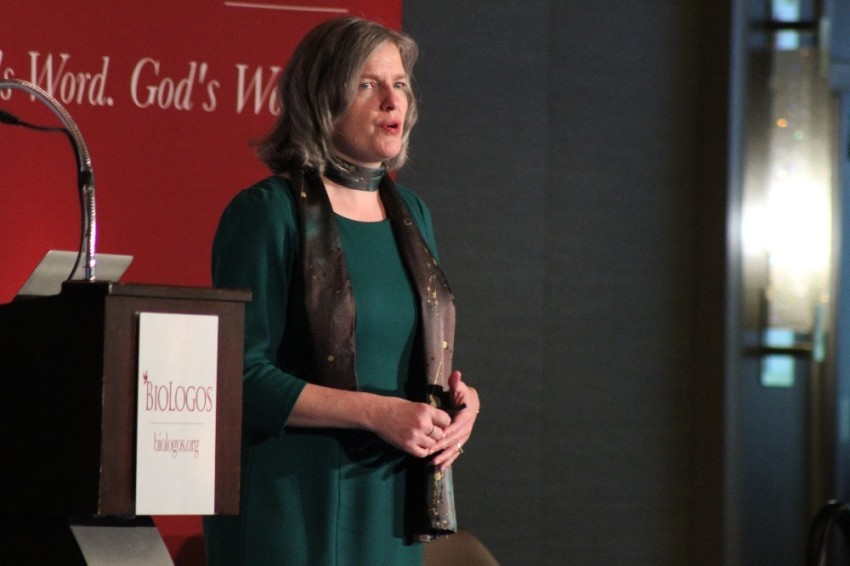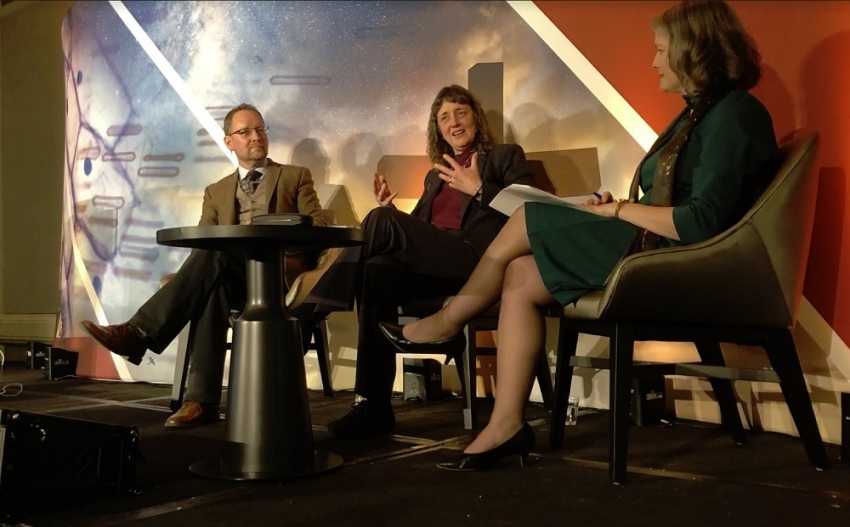Would the discovery of alien life disprove Christianity and the Bible?

BALTIMORE — As there is believed to be billions of planets in the universe, the theological implications that the discovery of intelligent alien life would have was overviewed at the recent BioLogos conference.
BioLogos Foundation President Deborah Haarsma, the former chair of Calvin College’s physics and astronomy department, gave her thoughts Thursday on tough hypothetical questions related to what the potential discovery of intelligent life on other planets would have on biblical claims and teachings.
The BioLogos Foundation is an advocacy group that exists to help bridge biblical faith with modern scientific theories, which many in today’s secular society believe must be at odds.
With a conference theme of “beyond conflict,” Haarsma outlined how the theology of incarnation wouldn’t be disproven if alien life were to be discovered on other planets.
While online commentators and atheists argue that the discovery of intelligent alien life would be the “end of organized religion," she shot down the notion that Christianity is “parochial” and something that is local with no cosmic significance.
Although the Bible is about events that took place on Earth, Haarsma pointed out that the Bible is even more narrow than that because it really focuses on Abraham and his descendants. In the New Testament, the Bible focuses on Jesus’ life and ministry.
She noted that the New Testament primarily takes place in the Middle East. Even in Jesus’ journeys, Christ did not travel too far of a distance from where He was born. Although the Bible is focused primarily on a certain geographical region, its message still applies to the entire Earth.
“God’s revelation was very particular for a particular culture and a particular place. But yet, the claims of Scripture are cosmic,” she said. “In Colossians 1 it says that ‘In Him, all things were created: things on Heaven, things on Earth, visible, invisible, thrones, powers, rulers, authorities.’ All those things were created through Him and for Him.”
The biblical text from Colossians 1, Haarsma contended, suggests that claims of Christianity reach far beyond Earth and “inhabit the whole cosmos.”
“[T]he Christ that was incarnate here on Earth was the same Christ of the whole universe,” she added. “Whether or not there are intelligent aliens, the Bible’s claims are cosmic in scope and [and can’t be] shoveled aside.”
Some might ask whether the discovery of alien life reduces the significance of the human race.
“Whether or not there are intelligent beings, we are significant in God’s eyes,” Haarsma asserted. “How do we know? Well, the incarnation is a huge clue. God came and lived here as one of us. Christ died for us. He sent His spirit to live with [us]. These are the things that make us significant in God’s eyes [like] our relationship with Him.”
But would the discovery of intelligent alien life alter views on Christ’s incarnation? Haarsma explained that such a question is one where many Christians disagree. There are several theological possibilities, she pointed out.

One possibility is that Christ’s sacrifice on Earth redeemed the entire universe, while another possibility is that aliens might not need redemption because they might have made a different choice than humans when it comes to sin and the Fall.
Another option, she argued, was that God might have also been incarnated on alien planets to provide redemption in those worlds. The last possibility she mentioned is that aliens have their own way to God that is different from the paths humans have to God.
Haarsma noted that this idea of God being incarnated on other planets was suggested in the final novel of C.S. Lewis’ The Chronicles of Narnia series.
“In Narnia, you have the idea of Aslan, God appearing in the form of a Lion in a different world,” she explained. “And by the time you get to the end of The Chronicles of Narnia in The Last Battle, you see him acknowledge that there are many worlds all pointing to one God. But God incarnates in different ways.”
In Perelandra, part of Lewis’ The Space Trilogy, Haarsma noted that Lewis talks about how life that is born after the incarnation would still look like Christ. It is the notion that God’s incarnation on Earth has an effect on what intelligent life looks like elsewhere.
“I don’t know the right answer to this. There are multiple options here to consider,” she admitted.
“So I don’t think this is a showstopper for Christianity. It is something that we need to wrestle with. Christians have multiple views on how God can be related to aliens. But we do know that Christ took on human form. So our understanding of the incarnation itself here on Earth is still robust.”
Despite the different possibilities, Haarsma asserted that God’s character will remain the same.
“It is the same character of love, the same desire to be sacrificial, the same desire to redeem people to Himself,” she stressed. “While Christians have multiple views on God related to aliens, we know that Christ died to redeem human sin.”
Haarsma was joined by NASA astrophysicist Jennifer Wiseman and astrobiologist Stephen Freeland on Thursday. Wiseman discussed the proof that there is an abundance of exoplanets and stars that exist throughout the universe. Freeland focused on the origins and distribution of life on Earth.
Follow Samuel Smith on Twitter: @IamSamSmith
or Facebook: SamuelSmithCP



























